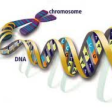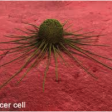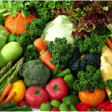Article by Lisa Sayers
DIET, LIFESTYLE and CANCER
Over 140,000 people die of cancer every year in the UK, many more struggle with the distressing and disabling effects of this disease. This article aims to provide information on dietary influences on cancer development and foods that may influence cancer growth and spread.
WHAT IS CANCER?
 Throughout our lives bodily cells are constantly dying, multiplying and being replaced. Each time a cell divides, our DNA has to be copied exactly to reproduce the exact same cell. Mistakes can occur that can lead to cancer. When our immune system is working effectively i.e. is not adversely affected by stress, environmental toxins, alcohol and poor nutrition then these errors may be detected and repaired. Our diet can provide an internal environment which is high in anti-cancer compounds, which may enable us to reduce the risk of cancers growing and spreading. Cells within our body contain our ‘genetic material’ which carry the instructions for who and what we are e.g. eye colour, hair colour, potential height, disease risk.
Throughout our lives bodily cells are constantly dying, multiplying and being replaced. Each time a cell divides, our DNA has to be copied exactly to reproduce the exact same cell. Mistakes can occur that can lead to cancer. When our immune system is working effectively i.e. is not adversely affected by stress, environmental toxins, alcohol and poor nutrition then these errors may be detected and repaired. Our diet can provide an internal environment which is high in anti-cancer compounds, which may enable us to reduce the risk of cancers growing and spreading. Cells within our body contain our ‘genetic material’ which carry the instructions for who and what we are e.g. eye colour, hair colour, potential height, disease risk.
This genetic material (containing approximately 25-30,000 genes) is contained within the nucleus of our cells on two strands that are bound tightly together with a cap (telomere) on either end to stop them unravelling. On each of the strands is a sequence of codes (ATCG etc). When we need to make new cells for our body (e.g. a liver cell), the cap is taken off the two strands, they are taken apart by enzymes and a specific sequence of codes are read (translated) and made into the appropriate cell by an internal factory within the cell called a ribosome. Only the parts that are unwound and exposed will be read and decoded.
WHAT CAUSES CANCER?
Some cancers have a genetic link but our genes are not always expressed. For example in identical twins one twin may have colon cancer the other may not, even though both twins have identical genetic information. Recent research shows that the internal environment that the genes are contained in effects whether we express our genes or not. Therefore the genetic ‘hand’ we are dealt, is not always played. Our genetic expression may be influenced by:
 Poor nutrition or over-nutrition (which may still be poor nutrition) and obesity.
Poor nutrition or over-nutrition (which may still be poor nutrition) and obesity.- Environmental toxins e.g. Pollution, smoking, industrial chemicals, heavy metals (lead, mercury etc.).
- Excess exercise, dealing with infection, stress and excessive sun exposure.
If our internal environment is not optimal then this may cause cell mutations, uncontrolled growth and proliferation of cells. Improving our internal environment may create an environment that is more inhospitable to cancer growth and aids in reverting cancer cells back to normality.
Nutrition and Cancer
Properties in certain plants and foods protect cells from damage, repair damage that may occur and contribute to the health of cells. Some of these properties are listed below:
Antioxidants
These are naturally occurring chemicals from fruits and vegetables which help to mop up damage (free radicals) caused by breathing, exercise, eating, pollution and chemicals that we expose ourselves to. Antioxidants may be obtained by eating a wide variety of different coloured fruit and vegetables and may help to protect our genes from damage. Quercitin is a plant chemical found in citrus fruits, dark berries, apples and apricots, green vegetables, onions, peppers, broccoli which has been shown to reduce cell division and cause cell death in colon cancer cells. Vitamin E found in nuts, seeds, peppers, green leafy vegetables and whole grains can cause apoptosis (cancer cell suicide), reduce the growth rate of colon cancer cells and supports the production and activity of a white blood cell called a natural killer cell which terminate cancer cells.
Enzyme Inducers
Detoxification is a function by which our body rids us of harmful substances and waste products such as hormones, drugs, alcohol, caffeine and cigarette smoke. The majority of detoxification in the body occurs in the liver. Toxic waste is removed from the body by using enzymes to break down dietary carcinogens and toxins and then removing them from the body via the urine or faeces. Enzyme production is reliant on the intake of certain dietary nutrients e.g. Brussel sprouts, curly kale, cabbage, broccoli, garden peas, onions, leeks, citrus fruit (not grapefruit), red peppers and the herbs rosemary and basil. Reducing alcohol consumption is important as this adds a direct work load on the liver.
Enzyme inducers are compounds which stimulate the production of detoxification enzymes produced in the liver and can also neutralise free radicals. Enzyme inducers include:
 Quercetin and sulphurophane are naturally occurring chemicals found in onions, cabbage and broccoli-these enhance removal of carcinogens (cancer causing substances) from the body.
Quercetin and sulphurophane are naturally occurring chemicals found in onions, cabbage and broccoli-these enhance removal of carcinogens (cancer causing substances) from the body.- Flavonoids are naturally occurring plant chemicals which can be obtained from almost all fruit and vegetables but particularly from darkly pigmented fruits (berries, plums, grapes, and pomegranate). Flavonoids may provide protection to the DNA within our cells and bind to potential carcinogens in our body to allow them to be excreted.
Immune system Enhancers
Immune system enhancers are substances which improve the immune system’s ability to mount a defence against foreign organisms such as cancer cells. Examples of immune system enhancers are:
- Carotenoids, which are naturally occurring substances (found in peppers, carrots, tomatoes, dark green leafy vegetables) used to help make a protein called connexion 43 (C43). C43 is found on the membrane of cells and when it comes into contact with C43 on other cells it stops further growth of the cell. Cancer cells have few or no C43’s so their growth can be uncontrolled.
- Genistein found in soy products, selenium (from fish, meat and Brazil nuts), carotenoids and flavonoids may all help the body to bring cancer cells back under control. They improve communication between cancer cells and normal cells and help to force cancer cells back to normal behaviour.
- Cancer cells produce chemicals that attract blood vessels to grow to eat towards them to provide a blood supply. Lectins are naturally occurring substances found in soya beans which may inhibit blood vessel growth to new tumours. This essentially starves the blood supply to tumours, thereby inhibiting their growth, reducing their ability to spread and also helping to protect DNA.
- Butyrate is a substance produced by beneficial gut bacteria in the intestine. Healthy gut bacteria such as lactobacillus and bifidobacteria can be obtained from the diet by eating live yoghurt or sauerkraut. You can encourage the growth of good gut bacteria by feeding them food they like such as oats, onions, leeks, garlic, asparagus, beans, lentils (these are called prebiotics). The type of fibre contained in these foods also help to prevent mutation to colon cells.
- Herbs such as Echinacea, which enhance our immune system by increasing natural killer cells and production of an anticancer hormone called interferon. Plant fibre from pear skins and fungi contains a substance which provides a similar effect.
- Co-enzyme Q10 which is found in fish/meat and grains, improves the efficiency of the immune system in dealing with cancer.
- Omega 3 fatty acids-Cancer cells have sub normal levels of polyunsaturated fatty acids in their membranes which makes them less able to protect themselves from free radicles. Omega 3 fatty acids in high doses can cause cancer cells to self destruct (apoptosis). These fats are found in oily fish, flax seed, walnuts, soya beans, chia seed, pumpkin seed etc.
- Cancers secrete enzymes called matrix metallo-proteinases (MMP’s) which break down the structure around the cells in our body by eating holes through it. Omega 3 fatty acids, olive oil, soya beans and flavonoids (particularly from citrus fruits) help to prevent the destruction of cells matrixes around cancer cells which may help to stop them spreading and prevents new blood vessels from reaching the cancer.
- The herbs turmeric, chilli, ginger and ‘ECGC’ from green tea may also reduce cancer cell growth.
How to Decrease Your Cancer Risk
You increase your risk of cancer when your body’s ability to repair is overwhelmed. You can reduce the demands on your body by avoiding the following:
- Tobacco smoke.
- Smoked fish or meat.
- Fats heated to high temperature.
- Saturated fat (from animal products) in excess amounts.
- Pesticide and insecticide residues from non-organic food, gardening pesticides etc.
- Charred meat.
- Mould on nuts and grains.
- Excessive sun exposure.
- Exposure to pollution.
- Excess body weight.
Other contributors to cancer risk include lack of exercise, high fat diet, fried foods, refined grains (white bread/rice/pasta etc.), excess alcohol consumption (this will increase the workload of the liver) and excess consumption of red meat and dairy products may all contribute to increased cancer risk. High sugar intake may also increase cancer risk as cancer cells have more receptors for the hormone insulin on the surface of their cells. Increased insulin receptors increase the uptake of glucose into the cell, this not only feeds the cell but may also increase another hormone called ‘growth factor’ which promotes cell growth.
Other considerations:
Chronic stress causes the release of a hormone called cortisol. Cortisol may have a negative impact on our immune system and decrease the activity of natural killer cells which decreases immune surveillance against cancer cells. Stress increases the production of a protein in the body called nuclear factor kappa b (NF-kb). This protein prevents apoptosis and encourages blood vessel formation to injured tissue (and cancer cells), increases cell division and impacts on other hormones that encourage cell division and growth. Controlling stress levels through meditation, relaxation exercises, breathing exercises, creativity and experiencing positive emotions.
Please ensure that you contact your G.P or dietician prior to making any dietary changes. Be good to your body and look after yourself.
If you are interested in nutrition why not take our Nutrition For Physical Activity or our Level 4 weight Management Course
 Lisa Sayers Biography
Lisa Sayers Biography
Lisa Sayers is an ACSM health fitness specialist who is also a qualified Pilate’s instructor, dietary educator, NLP practitioner and lifestyle & weight management consultant. Her business Bodysense is based in central Henley and offers a bespoke service based upon integrative health combining expertise in physical movement with dietary intervention and life coaching (www.bodysense.co.uk).
